Joint Commencement ceremonies for Weill Medical College and Graduate School of Medical Sciences of Cornell University were held on May 20 in Avery Fisher Hall at Lincoln Center.
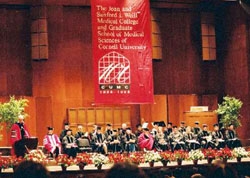
Commencement 2002 at Lincoln Center's Avery Fisher Hall
The Medical College conferred 101 M.D. degrees, and the Graduate School of Medical Sciences conferred 35 Ph.D. degrees and 10 M.S. degrees. Ten of the new Medical College graduates were members of the Tri-Institutional MD-PhD Program administered jointly by Weill Cornell, The Rockefeller University, and Memorial Sloan-Kettering Cancer Center.
President Rawlings' Remarks
Hunter Rawlings, president of Cornell University, was the principal commencement speaker. In his remarks to the graduates, President Rawlings emphasized the necessity for openness and academic freedom in advancing medical knowledge, the critical role of ethics in medicine and science, the benefits of modern technology, and the abilities of Weill Cornell's accomplished graduates to succeed, both as biomedical researchers and physicians.
Expressing a deep sense of pride in Weill Cornell, its graduates and New York City in the wake of Sept. 11, Rawlings gave credit to American ideals and Weill Cornell's academic legacy for the students' success in their academic, clinical and scientific work. "In the wake of the terrorist attacks, Weill Cornell has remained an open intellectual community committed to academic freedom within our democratic tradition... like the founders of the United States, we believe in free and open inquiry... free and open expression for all members of the community, respect for the ideas of others, and integrity and responsibility in the search for and the teaching and publication of knowledge. Our ability to do all those things depends upon, and is enhanced by, the diversity of our academic community."
On pursuing a global perspective to medical education, President Rawlings cited the University's initiative to establish the Weill Cornell Medical College in Qatar as "a way to address the complexities of human life in an area of the world where health issues and cultural traditions are substantially different from those at Weill Cornell in New York." The Medical College in Qatar, he emphasized, will be "based upon the principles of openess and academic freedom that are fundamental to Weill Cornell and to the University as a whole." The new school, he continued, will "contribute a global perspective to medical education that is even more important today than it was when you began your studies at Weill Cornell."
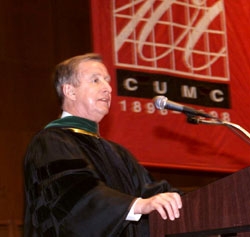
Dr. Antonio Gotto, dean of the Medical College
Commending the Class of 2002 on their ambition and their passion, President Rawlings urged the graduating class to nurture and sustain the "strong ethical compass" provided by their Weill Cornell education in the face of present and future ethical concerns. Citing Cornell alumnus, political theorist and noted author Francis Fukuyama, Dr. Rawlings said: "Dr. Fukuyama worries that attempts to enhance qualities like intelligence or longevity through genetic engineering may cause us 'to lose our humanity'—that is, some essential quality that has always underpinned our sense of who we are and where we are going... He worries that use of neuropharmacological drugs like Prozac and Ritalin may be moving us 'toward that androgynous median personality, self-satisfied and socially compliant'... and he warns that neither scientists nor bioethicists may be capable of the degree of self-regulation and restraint necessary to preserve the essential qualities of human nature on which 'our notions of justice, morality and the good life' are based."
President Rawlings expressed his confidence in the graduates' ability to recognize such dilemmas and to guard against abuses of medical science and technology. "I believe Weill Cornell has prepared you well for the ethical and moral challenges raised by genetic engineering and the whole range of new possibilities that are opening to us as a result of the biomedical revolution. Through the example of the professors with whom you have studied and carried out your research, through your coursework, and through the many service activities it has encouraged you to pursue, Weill Cornell has helped you to become superbly trained, intellectually receptive, and humanely grounded physicians and biomedical researchers."
Student Speakers
John Roseman from the Medical College and Francesca Domenech from the Graduate School of Medical Sciences represented their classes as the student speakers.
Dr. Roseman reflected on his family, personal and collective "moments of epiphany," shared experiences of joy, confidence, misery and excitement over new discoveries, and memorable moments with patients.
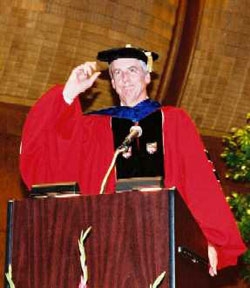
Hunter Rawlings, president of Cornell University
Urging his colleagues to follow their own passions, Dr. Roseman commented: "This is not a perfect profession, and the practice of medicine in the United States is many times flawed, but I want to believe that we can maintain our hope, conviction and excitement about this field as we have seen among many of our teachers. Years from now, will we still show that same excitement? Will we be able to recapture the thrill of being in the O.R. for the first time or the mixture of anxiety and wonderment as we first worked with psychotic patients? I hope we can."
Concluding his address to his classmates, Dr. Roseman said, "Let us love what we do—we will be healers, and we have chosen to do this out of love for the practice of medicine. Hopefully, we can pursue our calling in a way that will make our lives what we want them to be."
Dr. Domenech's remarks focused on the graduate school experience, scientific integrity, institutional legacy and personal accomplishment. On completing her thesis, she reflected, the "result is a legacy that, I think, I can be proud of that encapsulates my work as a graduate student. The satisfaction of holding your scientific ground with your mentors, your professors, and your collaborators is thrilling—that moment when you know more about your work than anyone else in the room."
Yet, being a competent scientist in the 21st century requires more than technical expertise, she noted. "As we leave academia, degrees in hand, we enter a society in this post-genomic era, where our actions are no longer confined to the realm of esoterica. We can reasonably expect that the work we undertake in our careers will be noticed, understood and subject to judgment by the general populace. Right now, we are on the cusp of a revolution in biology that has riveted the attention of the world. Our actions, now more than ever, must be very carefully considered."
Alumni Honors Go to Mandell and Mathieson
Commencement ceremonies also included presentations of the Medical College's and Graduate School's Alumni Awards of Distinction to Dr. Gerald L. Mandell, who received his M.D. in 1962, and Dr. Bonnie Jean Mathieson, who received her Ph.D. in 1975 (see separate article in this edition of the Dean's Bulletin.)
Doctors of Medicine: Weill Medical College
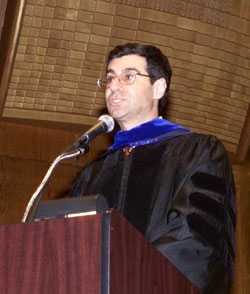
Dr. David Hajjar, dean of the Graduate School of Medical Sciences
Oscar J. Abilez
Ronda E. Alexander
Neville D. Bamji
Tara F. Bishop*
Jonathan W. Bress
Robert J. Brown
David D. Byrd
Tamara A. Chambless
Wambui Chege
Yu Chen**
Matthew R. Churchill
Michael S. Cohen
Holly E. C. Vanni
Maria F. Costantini-Ferrando
Leslie E. Diaz
Marc J. Dinkin
Nonkulie Dladla
Ted T. Du*
Tanya Dutta
Andrew J. Engel
Dori A. Engel
Diana Feldman*
Jonathan C. Fellers
Jenny M. Frances
Rebekah E. Gee*
Kendall L. Genre
Julie M. Gold
Caren K. Goodman
Eric M. Gordon
Jeffrey P. Greenfield
Pramod Gumpeni
Naomi I. Hayashi
Barbara Henriquez
Natasha A. Herron
Hilary M. Hochberg*
Suena W. Huang
Sherry L. Humphrey
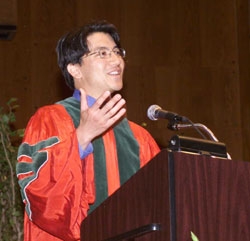
John Roseman, student speaker for the Medical College
Natalie A. Igel
Shamim M. Islam
Edward B. Jarvis
Yuliya S. Jhanwar
Claudine D. Johnson
Jeremy D. Kaufman
Amy S. Kelley
Steven M. Kleiner
Rupa Krishnamurthy
Lena F.-W. Kuo
Courtney L. Lee
Scott A. Lehto
Nadine A. Lettman*
Martha J. Lewis**
Liana H. Leung
Daniel A. Lim**
Quanjing Liu
Roger S.-C. Lo**
Richard T. Logue
Melissa L. Martin
Diane E. McLean
Christopher M. McStay
Veronica M. Meneses
Benjamin T. Milligan
Lisa A. Mills
Steven Milman
Reuven B. Minkowitz
Gretchen L. Mockler
Tina D. Montemurno
Cynthia I. Muñoz
Rachel Nussbaum*
Dana E. Orange*
Murali A. Ranjithan
Daniel S. Reich**
Ryan M. Romeiser
John B. Roseman
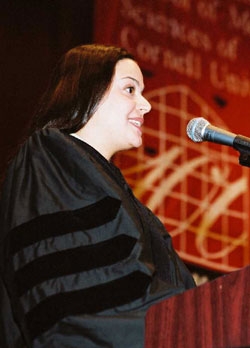
Francesca Domenech, student speaker for the Graduate School of Medical Sciences
Glenn Rosenbluth
Francine Samuels
Felipe Santos-Morales*
Johannes S. Schlondorff**
Cheryl B. Schreiber
Lauren K. Schwartz
Monique I. Sellas
Jian Shen
Nora M. Sigurani
Ameet Singh
Margaret L. Skinner*
Zsofia K. Stadler
R. Scott Staton
Alexander B. Steever
Steven H. Stein
Asif K. Suri
Andrew W.-Y. Tai**
Erin M. Thelander
Jaime L. Torres II
José M. Trevejo**
Mitul R. Vakharia
Juan P. Vernon
Dorothy Wang
Henry G. Wei
Adam R. Weinstein
Elisabeth B. Winterkorn
Yu Wong**
Julie Zikherman
*MD with honors in research
**Cornell/Rockefeller/Sloan-Kettering Tri-Institutional MD-PhD Program Graduate
Doctors of Philosophy: Weill Graduate School of Medical Sciences
Simi T. Ahmed
Susan B. Appleby
William A. Barton
Howard H. Berman
Alejandro Bernal
Elizabeth A. Bolan
Lian Chen
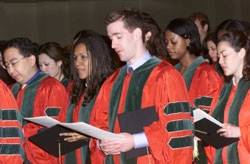
Graduates of the Medical College recite the Hippocratic Oath.
Kwang-Min Choe
Gian K. Do
Francesca Domenech
Matthew T. Gilbert
Hao H. Ho
Wonpil Im
Robert A. Johnson
Steven F. Kalik
Shannon Keller
Michael A. Lampson
Frank P. Leu
Yixin Lin
William E. Lowry
Jennifer R. Lytle
Melissa Mcgrath
Hoang D. Nguyen
Alexander Owyang
Yi Pei
Wendy K. Roberts
Quentin J. Sanders
Teodora Staeva-Vieira
Wendy Su
Eun-Kyung Suh
Jeffrey J.-C. Tsai
Brian A. Turner
Alin Vonica
Rebecca M.Wolf
Lie-Wei Xu
Jing Zhu
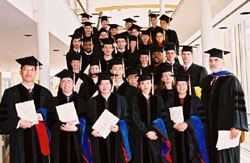
New Ph.D. graduates gather for a group photo with associate dean Dr. Joel Pardee (far right).
Masters of Science: Weill Graduate School of Medical Sciences
Jeffrey Coleman
Heide M. G. Hassing
Evan Leibowitz
Lilli Link
Paul Moench
Karen Moody
Raymond Pastore
Chad W. Thompson
Carrie L. Wysocki
Maurizio Zambenedetti

